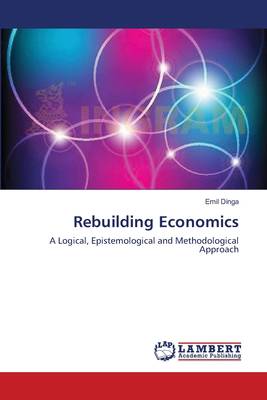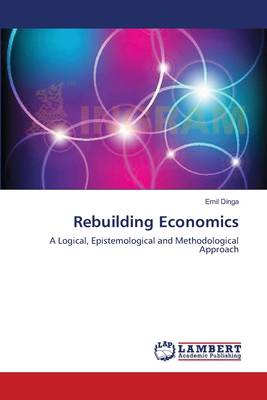
Bedankt voor het vertrouwen het afgelopen jaar! Om jou te bedanken bieden we GRATIS verzending (in België) aan op alles gedurende de hele maand januari.
- Afhalen na 1 uur in een winkel met voorraad
- Gratis thuislevering in België vanaf € 30
- Ruim aanbod met 7 miljoen producten
Bedankt voor het vertrouwen het afgelopen jaar! Om jou te bedanken bieden we GRATIS verzending (in België) aan op alles gedurende de hele maand januari.
- Afhalen na 1 uur in een winkel met voorraad
- Gratis thuislevering in België vanaf € 30
- Ruim aanbod met 7 miljoen producten
Zoeken
Rebuilding Economics
A Logical, Epistemological and Methodological Approach
Emil Dinga
Paperback | Engels
€ 93,45
+ 186 punten
Omschrijving
The book is focused on four main field of interest: 1) rebuilding of the Economics, on its own logical, epistemological and methodological bases (reinsertion of the economic subject into the economic phenomenology, replacing of the clock time by the economic time in measuring the economic process, reassessing of: the analitycity of the economic propositions, the possibility of economic predictions and of their factual falsification, mathematics and the economic modelling and comprehension); 2) clarifying the concept of sustainability of economic growth and development (history and logic of actional paradigms, sustainable financial sources, automatic stabilizers, logically vivid systems, entropy); 3) economic inertia and its conceptual family (inertial causes in the economic process, inertial mechanisms, continuum economic time-space, typology of economic inertia); 4) reexamining the logical bases of some important economic concepts and phenomena (economic cycle without the crisis phase, tax evasion, inflation, real economic convergence inside the European Union, fiscal impulse, underground economy). The most issues addressed by the book deliver more openings than closings.
Specificaties
Betrokkenen
- Auteur(s):
- Uitgeverij:
Inhoud
- Aantal bladzijden:
- 524
- Taal:
- Engels
Eigenschappen
- Productcode (EAN):
- 9783659137884
- Verschijningsdatum:
- 26/05/2012
- Uitvoering:
- Paperback
- Afmetingen:
- 152 mm x 229 mm
- Gewicht:
- 762 g

Alleen bij Standaard Boekhandel
+ 186 punten op je klantenkaart van Standaard Boekhandel
Beoordelingen
We publiceren alleen reviews die voldoen aan de voorwaarden voor reviews. Bekijk onze voorwaarden voor reviews.









